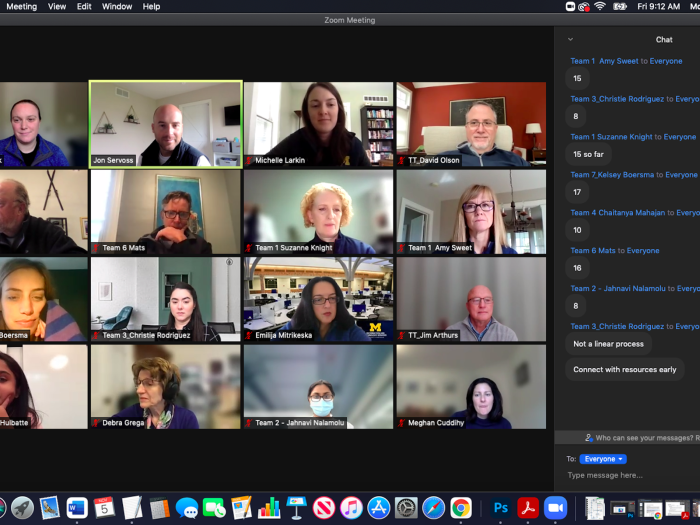
IRBMED’s Education Program was designed and developed through collaboration with members of the research community. It is our goal to make sure this program is tailored to meet the ongoing educational needs of the research community.
Until further notice, all IRBMED courses and presentations will be held online via Zoom meetings.
IRBMED offers a range of courses to provide the research community with education to improve understanding of regulatory requirements, eResearch application completion, and special topics related to human subjects research. Below is IRBMED’s Course Offering grid, outlining the different categories each course is a part of and the level of experience each course was designed for. Additionally, the Course Description document specifically explains the intent of each course.








The University of Michigan IRBMED offers consults on various topics related to the protection of human participants in research. These educational consults are designed for small groups (typically less than 10 people). We can attend research team or divisional meetings and present on the following topics:
Compliance
This is an informal overview of the process that is followed should a subject file a complaint about your project, including information about what is Serious or Continuing Non-Compliance. You’ll also be provided with tips and examples regarding how to avoid non-compliance issues. To request this session, please contact IRBMED at 734-763-4768.
General Education
General education sessions can be required to provide information regarding the IRBMED structure and processes, information on policies and regulations, and adverse events (AEs), and Other Reportable Information or Occurrences (ORIOs). Help with using eResearch—the university’s electronic research administration site—is also available. Continuing education credits are not offered for IRBMED education sessions, however, a record of attendance will be provided opon request. Tailored informational sessions for study teams or departments are also possible. To request such a session, please contact IRBMED Education coordinator by emailing [email protected].
HIPAA/Privacy Board
This is a brief overview of HIPAA regulations as they relate to research, with a focus on how and when to request a Waiver of HIPAA Authorization. This session also includes information regarding exempt and not-regulated application types and the functions of the Privacy Board. To request this session, please contact Privacy Board coordinator, Lark Speyer, by emailing [email protected].
Informed Consent
IRBMED’s senior technical writer can offer basic suggestions to help you write informed consent documents that are clear to subjects and compliant with federal and IRBMED requirements. For more information, please contact Technical Writer Senior, Brian Seabolt, by emailing [email protected].
In addition to the IRBMED offerings, UM offers other research education opportunities. There are non-UM education/training available as well.
University of Michigan
HIPAA Training for UM Researchers
Michigan Medicine requires a web-based HIPAA training module for the entire workforce, including faculty, staff, students, volunteers, contract employees, and others. Identify the module most appropriate to your role at the HIPAA Training Website. To enter a module in Cornerstone Learning:
- Log in to the portal through https://michmed.csod.com/samldefault.aspx
- Click the magnifying glass to “Search” on the upper right-hand side
- Enter “priv” (the beginning of the ‘code’ for the HIPAA modules) or HIPAA
PEERRS
UM requires this web-based Program for Education and Evaluation in Responsible Research and Scholarship (PEERRS) be completed by anyone engaged in or associated with human subjects research. Key personnel--principal investigators, co-investigators, faculty advisors, study coordinators, and project managers--must complete PEERRs before the IRB can approve a study. Responsibility for assuring all others complete PEERRS falls to the principal investigator. For more information, visit the PEERRS Website.
HRPP Education Resources
U-M Human Research Protections Program (HRPP) hosts links to other education modules available, including good clinical practice (GCP) training for study team members on NIH-funded clinical trials. For more information, visit the HRPP Education Resources site.
Michigan Institute of Clinical and Health Research (MICHR)
The Michigan Institute of Clinical and Health Research Education Program offers clinical research educational opportunities and resources to faculty and staff within UM. For more information, visit the MICHR Website.
Statistics
The Center for Statistical Consultation and Research (CSCAR) is a service and research unit of UM, administratively located in the Office of the Vice President for Research. Its staff provides statistical services to faculty, primary researchers, graduate students and staff of the University. To learn more about educational opportunities about statistical analysis in biomedical and behavioral research, visit the CSCAR Website.
Investigator 101
This two-part program provides basic information on the topics of ethics in research and investigator compliance with federal regulations. Part 1 presents the history of research ethics and key ethical issues are explored in terms of application to research design and study execution. Regulatory compliance topics as they apply to investigators are presented in Part 2. Examined is the IRB approval process, obtaining informed consent, continuing review and proper study documentation and record retention practices. It can be viewed online. You can also sign out a copy of the computer CD "Investigator 101" by emailing the IRBMED office.
OHRP Educational Activities & Materials
OHRP provide educational videos on a variety of topics regarding the Department of Health and Human Services (DHHS) regulations for the protection of human subjects of research described at 45 CFR 46. Each video is approximately 20-25 minutes in length.
If you have technical difficulties with viewing the videos, please see: https://videocast.nih.gov/faq/. For more information, please see: https://www.hhs.gov/ohrp/education-and-outreach/index.html.
Collaborative IRB Training Initiative (CITI)
This nationally recognized web course provides advanced educational modules that supplement those in PEERRS. A certificate issued upon completion of each module. The courses are free, but there is a charge to obtain Continuing Education Credits if you want/need them. For more information, visit the CITI Website.
2800 Plymouth Road
Ann Arbor, MI 48109-2800
IRBMED has full accreditation by they Association for the Accreditation of Human Research Protection Programs, Inc.